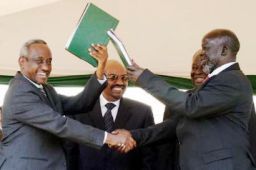Sudan power-sharing quotas won’t change until polls
KHARTOUM, July 2 (AFP) — A Sudanese government official said Saturday that power-sharing quotas agreed upon with the southern rebels would not change until elections are organised four years into the upcoming six-year period of interim rule.

|
|
Sudan’s First Vice President Ali Osman Mohamed Taha (L) and Sudan People’s Liberation Movement leader John Garang show the signed peace accord at a ceremony in Kenya’s capital Nairobi, January 9, 2005. (Reuetrs). |
The opposition has been clamouring for a greater share of power than the 20 percent it was allotted in the January North-South peace deal that ended 21 years of deadly fighting in Africa’s largest country.
The ruling National Congress party and John Garang’s Sudan People’s Liberation Movement granted themselves 52 and 28 percent respectively.
“The two parties that have signed the Comprehensive Peace Agreement (CPA) must be in command of the country and run its affairs at least during the first four years,” said Dirdiry Mohamed Ahmed, the co-spokesman of the National Constitutional Revision Commission (NCRC).
The quotas are to be enshrined in the temporary constitution — recently drafted by the NCRC and being reviewed by both parliaments — that will come in to force on July 9, when Sudan enters the period of interim rule.
The move sparked protests by the opposition that the National Congress and the SPLM were seeking to monopolise power at the expense of further national reconciliation.
The two parties “will remain in power unless the people decide otherwise during the general elections after four years”, Ahmed said at a press conference.
The other co-spokesman, the SPLM’s Yasser Arman also assured power-sharing quotas “will not last forever and will be observed only during the period that will precede the general elections.”
He said the two parties were committed to “the existence of a democratic opposition and to guaranteeing freedoms and democracy”.
In June, Khartoum signed a reconciliation agreement with the National Democratic Alliance, Sudan’s largest opposition bloc.
Negotiations on the contents of the deal are still ongoing and stumble on the issue of power-sharing.
